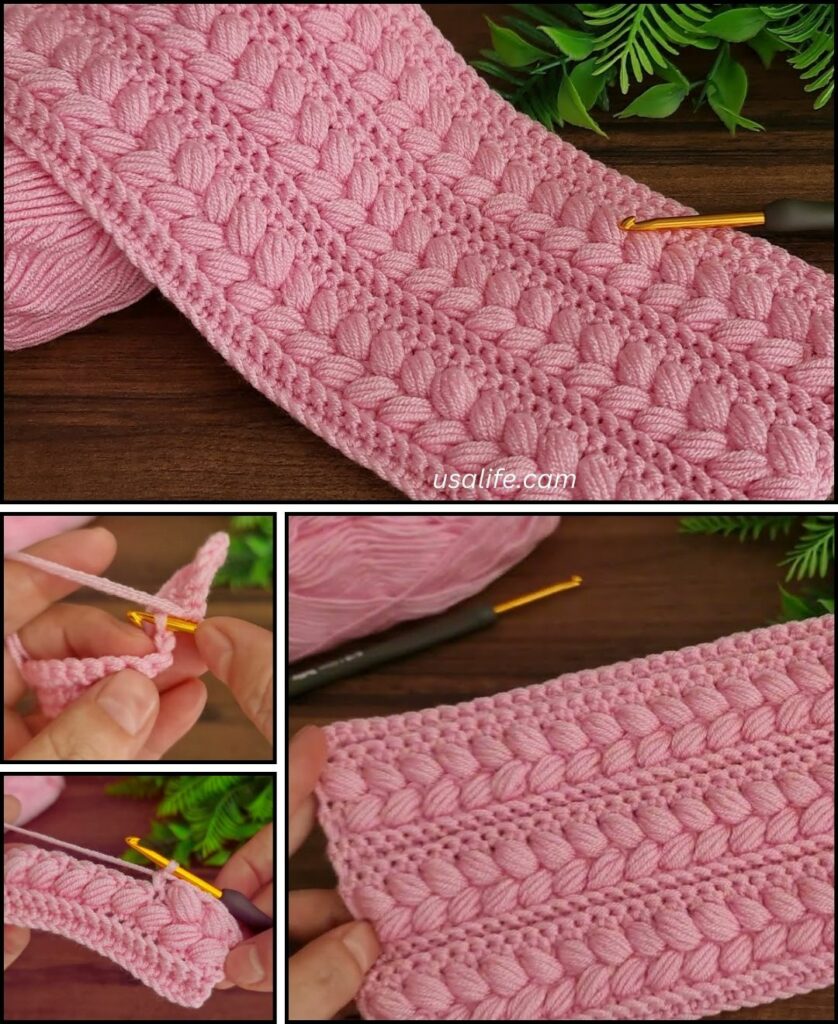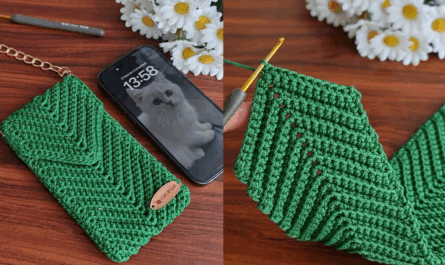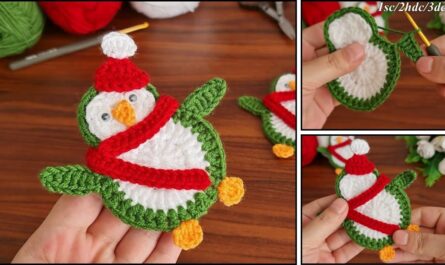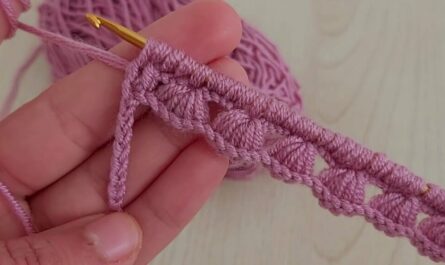When crocheting for baby projects like blankets and bags, selecting the right stitch is crucial. You want something that is not only visually appealing but also soft, safe, and durable. The best stitches for these projects are often those that create a dense fabric with minimal holes, so little fingers and toes don’t get caught.
Here are some excellent crochet stitches for baby blankets and bags, categorized by their best use and skill level.
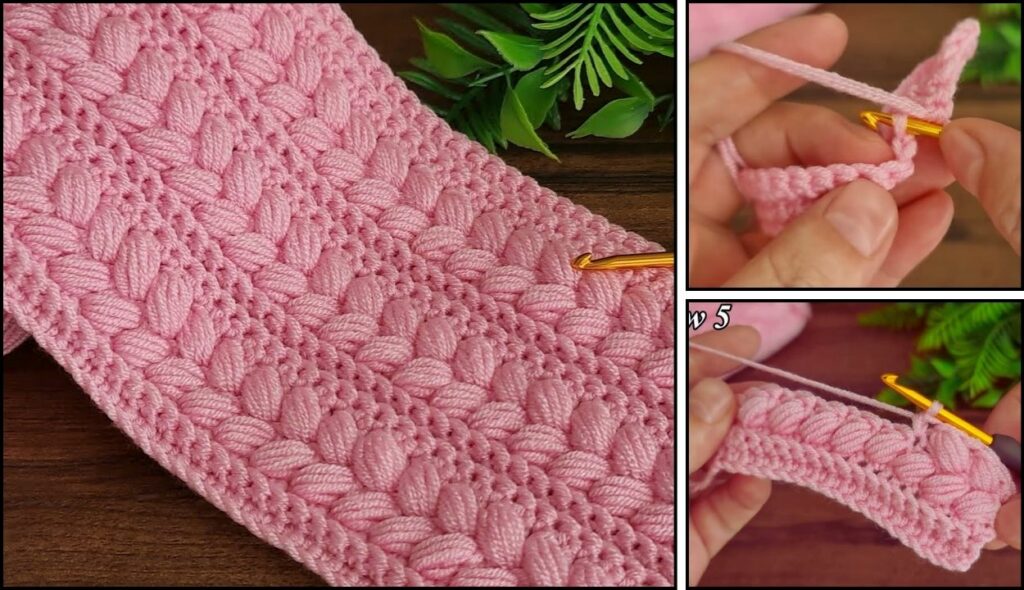
For Baby Blankets
The ideal baby blanket stitch is soft, comfortable, and has good drape. It should also be a stitch that is easy to repeat and works up relatively quickly.
1. Moss Stitch (also known as Granite Stitch or Linen Stitch)
This is a fantastic stitch for beginners. It creates a beautiful, dense fabric with a woven-like texture. It’s reversible and doesn’t have large holes, making it safe for babies.
- How to do it: The Moss Stitch is a simple one-row repeat using single crochet and chain stitches.
- Row 1:
scinto the secondchfrom the hook,ch 1,skthe nextch,scinto the nextch. Repeat[ch 1, sk 1, sc]across the row. - Row 2:
ch 2and turn.scinto the firstch-1space,ch 1,scinto the nextch-1space. Repeat[ch 1, sc]into eachch-1space across the row.
- Row 1:
- Why it’s great: The single crochet and chain combination creates a smooth, flat fabric that is both soft and sturdy. It’s also very relaxing to crochet once you get into a rhythm.

2. Half Double Crochet (hdc)
This is a great middle-ground stitch between the sc and dc. It’s taller than a single crochet, so it works up faster, but it’s not as tall as a double crochet, which can create a looser, lacier fabric.
- How to do it: A baby blanket using
hdcis usually just a simple back-and-forth pattern.- Row 1:
chyour desired width (plus 1),hdcin the secondchfrom the hook and in eachchacross. - Subsequent Rows:
ch 2and turn.hdcin the first stitch and in each stitch across.
- Row 1:
- Why it’s great: It creates a lovely, cozy texture and is very quick to work up. It’s a simple, classic choice that’s perfect for both beginners and experienced crocheters.
3. Suzette Stitch
For a beautiful, textured blanket, the Suzette Stitch is an excellent choice. It combines a sc and a dc in the same stitch to create a rich, bumpy texture.
- How to do it: The pattern is a simple one-row repeat.
chan even number of stitches.- Row 1:
[sc, dc]into the secondchfrom the hook.skthe nextch. Repeat[sc, dc]into the nextch,skthe followingchacross the row. End with ascin the last stitch.ch 1and turn. - Row 2 and beyond:
[sc, dc]into the first stitch.skthe next stitch. Repeat[sc, dc]into the next stitch,skthe following stitch across the row. End with ascin the last stitch.ch 1and turn.
- Why it’s great: This stitch creates a thick, warm, and highly-textured fabric that is perfect for a cozy baby blanket. The alternating stitches make for an engaging and fun project.

For Baby Bags
When it comes to bags, you want a stitch that provides durability and structure. You also want a dense fabric so things don’t fall out of the bag.
1. Single Crochet (sc)
The sc is the go-to stitch for a sturdy and durable bag. It creates a dense, tight fabric that won’t stretch out easily, which is crucial for carrying items.
- How to do it: Work
scstitches back and forth in rows or in continuous rounds. - Why it’s great: It’s the most basic and firm stitch, making it perfect for the main body of a bag. You can add a decorative border or handle with a different stitch, but the main body is best with
scfor its strength.
2. Linked Double Crochet (ldc)
This is a clever variation of the dc that eliminates the gaps and holes that double crochet is known for. It creates a strong, solid fabric that’s still flexible.
- How to do it: Instead of a regular yarn-over for a
dc, you insert your hook into the horizontal bar of the previous stitch to create a “link.” This makes the stitches lay closer together. - Why it’s great: You get the speed of working with a taller stitch (
dc) but the durability and lack of gaps of a shorter stitch. It’s a perfect compromise for a bag.

3. Waistcoat Stitch (also known as the Knit Stitch)
This stitch gives your crochet a stunning, knitted-like appearance. It’s a type of single crochet worked in a specific way that creates a very dense and sturdy fabric.
- How to do it: Work a
sc, but instead of inserting your hook under the two top loops, you insert it between the “legs” of the stitch from the previous row. This is usually worked in the round. - Why it’s great: It creates an incredibly thick and strong fabric with a beautiful texture, making it ideal for a bag that needs to hold its shape.
Tips for Both Projects
- Yarn Choice: Choose a soft, machine-washable yarn like acrylic or a cotton blend. Stay away from yarns that might be scratchy or have fibers that could come loose, as this can be a safety hazard for a baby.
- Tension: Keep your tension consistent. For blankets, a slightly looser tension creates a nice drape. For a bag, a tighter tension will give you a sturdier fabric.
- Safety: Always check for any loose ends and weave them in securely. Avoid using buttons or other small embellishments that could be a choking hazard for a baby.
